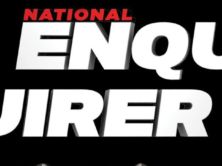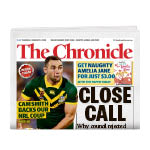
See above a detail of a screenshot from Justine Davidson's article, explaining the legal conflicts between Canada's CBC Radio and the Yukon News. (Credit: Whitehorsestar)
A Canadian newspaper is taking a radio station to court to force the station to reveal its anonymous sources. This is “the first time one Canadian media organization has taken another to court to reveal an anonymous source – usually it is a principle which media associations pile on to protect,” the newspaper The Whitehorse Star reported.
(The Whitehorse Star and The Yukon News are two of the three newspapers in Whitehorse, Yukon Territory, Canada, according to the Mondo Times. About three-quarters of Yukon’s population of 34,157 live in Whitehorse, the government of Yukon reports.)
The Whitehorse Star detailed the story of the unusual media lawsuit.
In response to an e-mail inquiry from iMediaEthics, Steve Robertson, the publisher of the Yukon News wrote that he “can’t comment on the record on any of this until the matter is resolved.”
But, Robertson wrote that he “would be happy to contribute to the journalistic debate” once that has happened. “I will say the issues surrounding confidential sources in this specific case are not as clear as our competitor’s story indicates,” Robertson added.
Robertson attached a copy of Mosytn’s editorial, but we won’t be linking to it as the defamation case resulting from it is still pending. He explained that it’s not on the Yukon News’ website because the newspaper redesigned and the content didn’t “mitigate” from the old site to the new site.
The Backstory, reported by the Whitehorse Star
Nancy Thomson, a reporter at the radio station, CBC Radio, reported a series on abuse of prescription drugs in the local community of Watson Lake in 2004. Thomson promised many of her sources anonymity, even distorting the voices of some sources to further mask their identity.
Later that year, Richard Mostyn, the editor of the local Yukon News, wrote a newspaper editorial based on her series, including information about a physician Thomson cited. The physician, Said Secerbegovic, was named in Thomson’s report and had no issues with Thomson’s reporting. But he did take issue with Mostyn’s editorial. Secerbegovic claims “the editorial piece caused him professional and personal harm,” and filed a libel suit years ago.
The Yukon News wants all of Thomson’s notes from her reporting so that it can defend itself against Secerbegovic’s claim. But, she “has refused to hand over her notes. She has filed an affidavit saying the people she interviewed only spoke because she promised to protect them,” The Whitehorse Star reported.
In the affidavit, Thomson wrote her “dozens” of sources “feared retribution, embarrassment and further marginalization and ostracism if they were identified.” She further explained that outing her sources “would not only destroy her own ability to work in the community, but for other reporters as well.”
David Sutherland, the lawyer for the Yukon News, rejected CBC Radio’s offer to give the newspaper Thomson’s notes with sources’ names blacked out, Whitehorse Star reported. “According to the application filed by the News, Mostyn and publisher Steve Robertson would go so far as to put Thomson’s interviewees on the stand to prove what Mostyn wrote about Secerbegovic was true.”
Whitehorse Star reported previously on this case when the Yukon News asked for the defamation case to be dismissed “because of an excessive delay in proceedings caused by ” Secerbegovic. He filed suit in 2005 over the November 2004 editorial “The Messenger Hit Again.”
IMediaEthics has e-mailed CBC Radio for more information and will update with any response.






